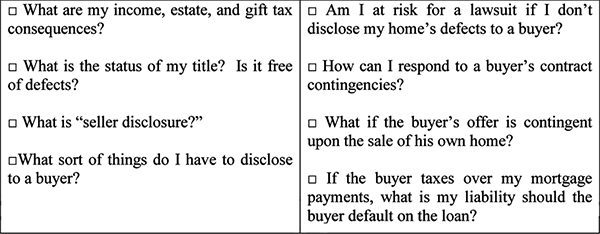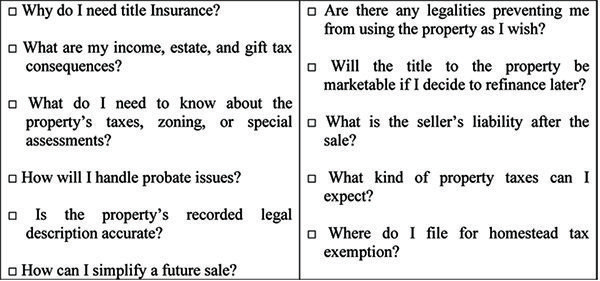Protecting Your Interests When Buying or Selling
By C. Lane Wood
YOUR HOME IS A VALUABLE ASSET. So is your attorney.
Although many people will be happy to inject their opinion, an attorney is the only one qualified to give you legal advice, and legal advice is just what you need when you’re buying or selling a home. The truth is, a lot of things can potentially go wrong – before, during, and beyond your closing. Hiring an attorney can help head off issues before they become problems. By choosing to use an attorney, you do yourself the favor of ensuring a smoother transaction.
ANSWERING ALL YOUR QUESTIONS. Even the ones you don’t know about.
One of the greatest benefits of using an attorney is that he or she has a legal and ethical obligation to work in your best interest. That means answering a lot of nitty-gritty questions, including some very important ones that you may or may not know to ask.
BUYING A HOME? Here are some important questions an attorney can answer for you:
SELLING A HOME? Here are some important questions an attorney can answer for you:

WHEN IS THE BEST TIME TO HIRE AN ATTORNEY?
Whether you’re buying or selling a home, the earlier in the process an attorney is involved, the better. Since the purchase contract is a blueprint for closing on your home, it dictates in black and white how the rest of the transaction will unfold. Never sign a contract without your attorney reviewing it. At the very least, you should write in a contingency clause saying the contract is valid only with my attorney’s approval.
Someone may tell you the contract is standard and customary. But since no two homes are alike and no two buyers and sellers are alike, there’s really no such thing as “standard and customary.”
WHAT YOU GET AND GET TO AVOID WHEN USING AN ATTORNEY.
Your attorney can also handle numerous services for you in a timely, professional manner:
□ Review the contract, and explain to you all the provisions and contingencies
□ In proper legal language, add any contingencies needed to protect your interests
□ Inform you of your legal rights and obligations
□ Obtain a title search, evaluate the status of the title, and require appropriate legal remedies to clear any defects
□ Check for unrecorded municipal liens
□ Advise you on what the title policy does not protect against, so you understand any issues with the marketability of the title
□ Prepare or review the closing statement and other closing documents
□ Interpret and counsel you about all legal documents related to the title and transaction, including deeds, mortgages, and closing statements
□ Advise you on how you should take title to the home if you’re buying, and how this affects your estate
□ Prepare a bill of sale to cover personal property such as curtains and appliances that you and the other party agree shall remain in the home
□ Inform you about the income, estate, and gift tax consequences to your estate
□ Review the property survey and discuss with you any potential problems
Without an attorney by your side, you might face issues such as:
□ Unnecessary taxes or expenses because purchase contract terms weren’t negotiated in your favor
□ A contract that isn’t enforceable, complete, or consistent with your original intent
□ Breach of contract causes by a lack of full understanding of the terms and its contingencies
□ Lawsuits that can result from not understanding responsibilities for the seller disclosure
□ Finding out someone else has, or is claiming to have, rights to you property
□ Problems with the title that make it difficult for you to sell the property in the future
PEACE OF MIND COMES AT NO EXTRA
CHARGE
You have the choice of hiring either a non-lawyer title agency or real estate attorney to handle your title insurance. The cost of closing through a real estate attorney is typically about the same as the cost of using a title agent. Each will charge a one-time fee ranging from a few hundred to more than a thousand dollars, depending upon the sale price of the home. While the fees are comparable, the value is quite different. A real estate attorney is trained in the complexities of real estate law, can examine your title and issue your title insurance policy. A real estate attorney can also negotiate contracts on your behalf, give you legal advice, explain the meaning of the documents you will be asked to sign at closing and resolve title issues and disputes. A title agency that isn’t affiliated with a real estate attorney cannot legally do any of these things.
Whether or not a separate real estate attorney fee will be charged depends upon the way the transaction is structured and whether you request or require additional legal services that an ordinary title agent is not able to deliver. Otherwise, if your attorney acts merely as the closing agent and provides title insurance, there may be no other fess involved. If you hire an attorney to review the title commitment and other documents prepared by someone else, a moderate and reasonable fees will be charged, with the actual cost varying upon situational factors and the complexity of the chain of title or the transaction.
Ask several real estate attorneys for an estimate of the charges you might incur when shopping for closing and/or legal services. Make sure the attorney you choose is one who can clearly and patiently explain the confusing aspects of the real estate buying and selling process.










